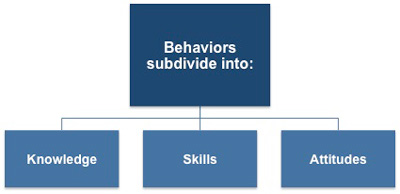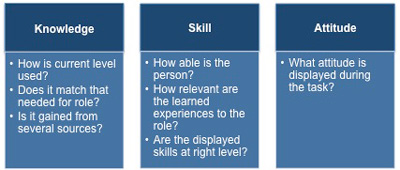Measuring Competencies
Measuring competencies is an essential part of assessing a team member's performance. You can use the role description or job specification to define the required competencies, but how do you actually measure them in a way that is objective and evidence based?
Fortunately, there is a straightforward way of measuring competencies that is fair and not too time consuming. The first step is to consider any competency in terms of the behaviors that define it. These behaviors can then be thought of in terms of KSAs, an acronym that stands for Knowledge, Skills, and Attitudes. This provides a way of breaking down behaviors into more easily measurable components.
 |
Over the years other definitions of KSA have appeared and whilst their overall meanings are very similar, there is no universally accepted definition. This is further complicated by the fact that specific industries have their own KSA definitions that reflect the nature of their work.
The definitions we have used here are easy to understand and use and will enable you to make a practical evaluation of a team member's behavior based on their:
KNOWLEDGE
How does the individual use the knowledge they have?
Is it appropriate to their role?
Does the person make use of more than one type of information - facts / ideas / principles?
SKILL
What abilities does the individual have?
Are the learned experiences of the person relevant to the required role?
Can the individual exhibit such skills at the appropriate level?
ATTITUDE
Does the individual approach the task with the appropriate attitude?
As a manger you will be especially keen to monitor and observe what type of attitude a member displays in a whole range of activities. This includes how the individual interacts with others, and how their attitude is perceived.
For example, imagine that you are a manager of a technical support team. Each member of your team is responsible for fixing customers' problems with software that your organization has supplied. When dealing with an incoming call, you would expect each member to display the following KSAs:
- Appropriate Knowledge - this means that each member has the technical know-how to fix the problem.
- Communication Skills - each member has the ability to communicate with the customer in such a way that the latter will understand their problem and how it will be resolved.
- A Positive Attitude - every customer calling the support team will feel that their problem is being dealt with efficiently and with understanding, regardless of how trivial their problem may be, so that the customer is comfortable throughout the call.
All three of these behavioral elements are essential to providing a high level of customer support and your ability to measure them objectively is vital to making an accurate assessment of a team member as well as being able to help them to improve their performance.
 |
Remember that all three components - knowledge, skills, and attitude - are equally important. If a customer is dealt with respectfully and with enthusiasm they will be more tolerant of a support member who may not have the immediate answer but who takes the time to explain what can be done to help.
On the other hand, even if their query is resolved quickly the customer may feel aggrieved if someone who sounds bored, supercilious, or condescending deals with their call. The end result for the organization is that the customer will hesitate before buying or using further services and may even persuade others to find an alternative service or product.
You may also be interested in:
Competency Development Process | Competency Framework Example | Example Competency Framework | Knowledge, Skills and Attitudes | Developing Competencies at Work.



